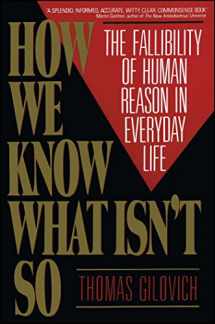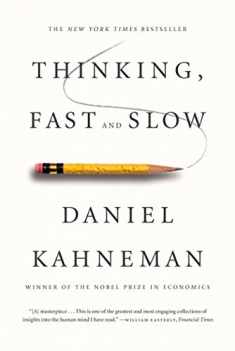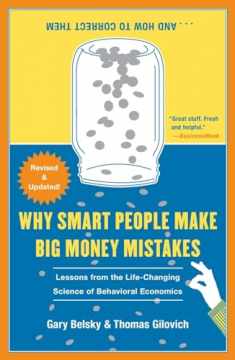
How We Know What Isn't So: The Fallibility of Human Reason in Everyday Life
ISBN-13:
9780029117064
ISBN-10:
0029117062
Edition:
Reprint
Author:
Thomas Gilovich
Publication date:
1993
Publisher:
Free Press
Format:
Paperback
224 pages
FREE US shipping
Book details
ISBN-13:
9780029117064
ISBN-10:
0029117062
Edition:
Reprint
Author:
Thomas Gilovich
Publication date:
1993
Publisher:
Free Press
Format:
Paperback
224 pages
Summary
How We Know What Isn't So: The Fallibility of Human Reason in Everyday Life (ISBN-13: 9780029117064 and ISBN-10: 0029117062), written by authors
Thomas Gilovich, was published by Free Press in 1993.
With an overall rating of 4.1 stars, it's a notable title among other
Child Psychology
(Psychology & Counseling, Personality, Social Psychology & Interactions, Cognitive Psychology, Behavioral Sciences, Cognitive, Psychology, Child Psychology, Social Psychology & Interactions, Logic & Language, Philosophy) books. You can easily purchase or rent How We Know What Isn't So: The Fallibility of Human Reason in Everyday Life (Paperback) from BooksRun,
along with many other new and used
Child Psychology
books
and textbooks.
And, if you're looking to sell your copy, our current buyback offer is $0.3.
Description
Thomas Gilovich offers a wise and readable guide to the fallacy of the obvious in everyday life.
When can we trust what we believe—that "teams and players have winning streaks," that "flattery works," or that "the more people who agree, the more likely they are to be right"—and when are such beliefs suspect? Thomas Gilovich offers a guide to the fallacy of the obvious in everyday life. Illustrating his points with examples, and supporting them with the latest research findings, he documents the cognitive, social, and motivational processes that distort our thoughts, beliefs, judgments and decisions. In a rapidly changing world, the biases and stereotypes that help us process an overload of complex information inevitably distort what we would like to believe is reality. Awareness of our propensity to make these systematic errors, Gilovich argues, is the first step to more effective analysis and action.
When can we trust what we believe—that "teams and players have winning streaks," that "flattery works," or that "the more people who agree, the more likely they are to be right"—and when are such beliefs suspect? Thomas Gilovich offers a guide to the fallacy of the obvious in everyday life. Illustrating his points with examples, and supporting them with the latest research findings, he documents the cognitive, social, and motivational processes that distort our thoughts, beliefs, judgments and decisions. In a rapidly changing world, the biases and stereotypes that help us process an overload of complex information inevitably distort what we would like to believe is reality. Awareness of our propensity to make these systematic errors, Gilovich argues, is the first step to more effective analysis and action.


We would LOVE it if you could help us and other readers by reviewing the book
Book review

Congratulations! We have received your book review.
{user}
{createdAt}
by {truncated_author}




